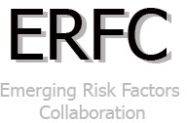Sharing the data with collaborators allows wider research, maximising its value. The following are the collaborations that BWHHS researchers are currently working with.
Emerging Risk Factors Collaboration (ERFC)
The BWHHS joins more than 130 prospective studies from more than 30 countries that make up the consortium Emerging Risk Factors Collaboration, led by the Cardiovascular Epidemiology Unit, University of Cambridge.

These studies have collated their individual level data creating a total of approximately 2.5 million participants. This has allowed meta-analyses to study risk factors for cardiovascular diseases and cause-specific mortality.
Risk factors studied include:
- Circulating lipid markers
- Inflammatory markers
- Glycaemia Markers
- Adiposity markers
- Diabetes
- Cardiometabolic multimorbidity
Output from the analyses focus on exposure-outcome associations and risk prediction analyses using public health modelling approaches.
To find out more visit the Emerging Risk Factors Collaboration website.
COMETS
BWHHS is one of the prospective cohort studies collaborating through the COnsortium of METabolomics Studies (COMETS).
Partcipating studies have followed at least 100+ participants for a range of outcomes and have performed blood metabolomic profiling of individuals.
The aim of COMETS is to accelerate the study of metabolomic profiles associated with chronic disease phenotypes,
- to improve our understanding of prediction of disease aetiology, diagnosis and prognosis.
Find out more on the COMETS website.

NCD Risk Factor Collaboration
The BWHHS joins over 2,500 population-based surveys from 193 countries forming the NCD Risk-Factor Collaboration (NCD-RisC).
NCD-RisC pools population-based data on risk factors for non-communicable diseases from the participating studies and currently holds risk factor levels for nearly 129 million participants.
To find out more visit the NCD Risk Factor Collaboration website.

 Close
Close

